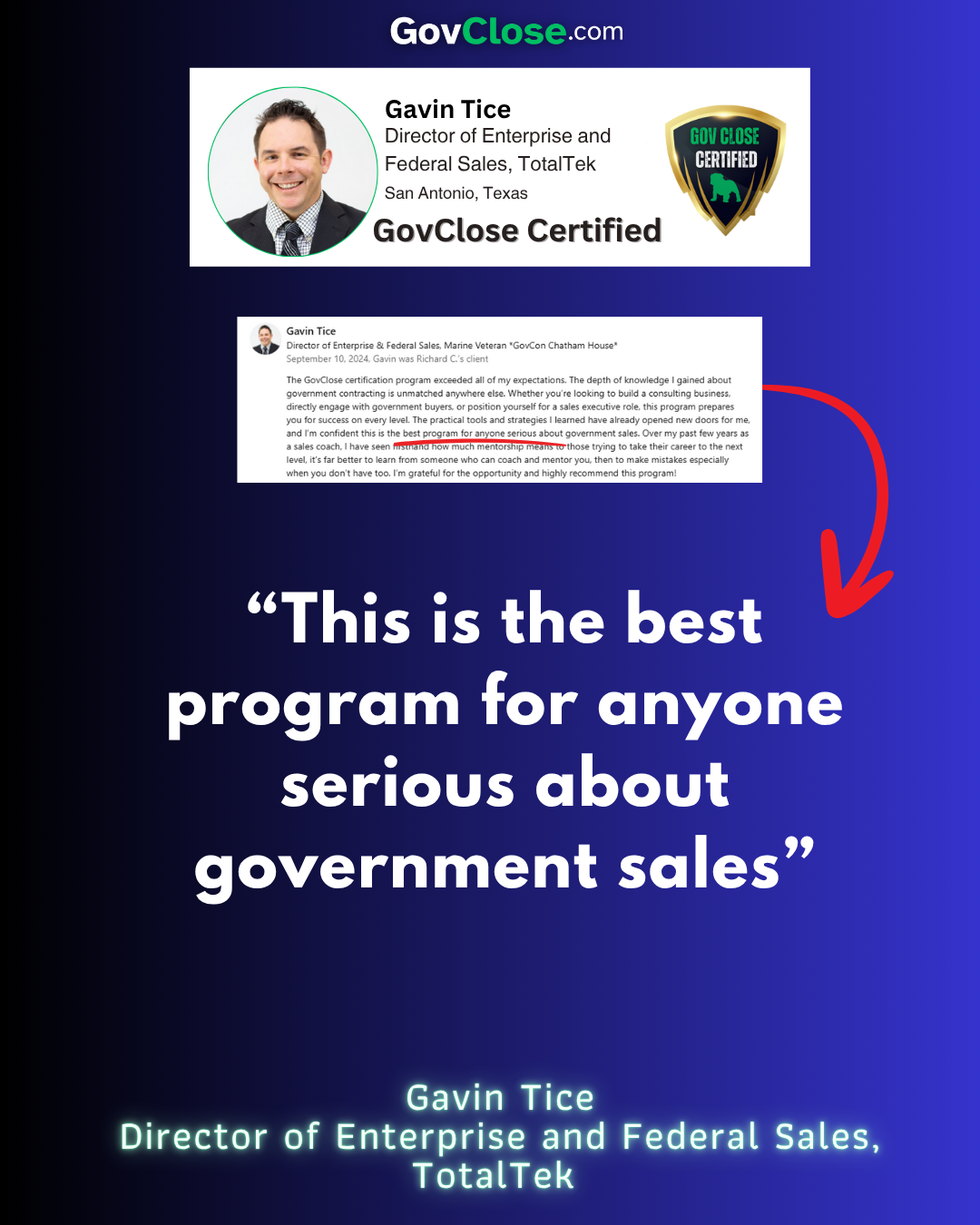
Defense Contracting Is Not A Jobs Program (Podcast Transcript)
Oct 13, 2022[00:09] Richard C. Howard: Hey, guys, Ricky here with Dodcontract.com, the Dodcontract academy and the government sales momentum podcast. And today I just want to rant a little because I put a post out in one of my groups on LinkedIn, and it just caused a huge you know what storm. And it basically started out with something I'm sure you've heard me say before, which is when I was program manager before, by the time a solicitation came out, I usually knew what company that either I wanted to hire or I knew what companies could actually perform the work that we were looking for. And my first line was something like that in this post, and it got a lot of attention. Most people knew exactly where I was going, but there were a few negative comments on there. I'm guessing they didn't read the entire post or they would have known where I was going. And I don't blame them. Those comments looked like something for, hey, this just proves that the acquisitions process is broken if there's predetermined outcomes and blah, blah, blah, blah, blah. And usually I can spot those comments because I've consulted with I don't know how many companies that have come to me with a similar outlook, like, hey, Rick, we think it's rigged, or we think that we see the same people winning over and over again, or maybe there's favorites within the government.
[01:31] Richard C. Howard: That was not the point of my post at all. The point is that no acquisitions team is just going to receive a requirement. From the government, right? So I wouldn't receive something saying, hey, the warfighter needs this technology now. It's this advanced waveforms, blah, blah, blah. Or maybe we need this large construction project on base or maybe a command and control system for the flight line, whatever it is. The program manager and the contracting officer are not experts at those things. And we might have an engineering team, but they probably didn't spend their whole careers on those things either, right? We need to put together if we have to put together a solicitation, we need to be able to reach out to the experts and figure out what requirements do we actually need in there. And so who are the experts?
[02:10] Richard C. Howard: Well, some of the research labs might have some advanced technologies we can talk to, but it's really the companies. And a lot of times it's the small businesses that are putting together innovative solutions that have been doing this their whole career. They are the experts. That's why we put out things like request for information and sources sought. That's why this whole process exists. We couldn't put together something like that if we weren't taking industry input ahead of time. And so when I read comments like. That, I don't get mad at them.
[02:37] Richard C. Howard: I get mad that there's so much misinformation out there about defense and government contracting that some companies don't even know this phase in acquisitions exists. And as soon as they hear about it, they think something's off. But they don't realize the whole point, especially with defense acquisitions, is the warfighter. The war fighter has a problem. The military man or woman has a problem that needs to be solved. We need to solve it right. And we need to solve it legally, but we need to solve it quickly. And we need to give them the best possible solution for the dollar. What defense acquisitions isn't or defense contracting, it's not a jobs program. Everybody doesn't get a trophy. And we absolutely should not be delaying buying the product or service that's going to help keep a military man or woman safe or even put clothes on their back or give them office supplies, whatever it is.
[03:45] Richard C. Howard: We need to be able to do that efficiently and effectively. And the only way in a lot of cases to do that is by starting in this market research phase, which happens way before solicitation, where we're actually figuring out what we need, what can solve the problem. And by the way, a lot happens there too. There might not ever be a solicitation. And this is why relationships are so important and by finding opportunities and this is what we teach in the academy. This is where I focus everything you need to be right here before the solicitation because as an acquisitions team, you're not thinking, hey, what is the way that we can do a huge contracting, huge timeline, huge competition to get 100 companies bidding on something and get it out to the warfighter in three years? That's not the point. Right?
[04:09] Richard C. Howard: Hey, what can we do as efficiently and effectively as possible within the bounds of the law so that could look like market research phase where we only find one company that can provide the solution. That's a sole source contract. And you're never going to see it on Sam Gov. You might see like a post that says, hey, we're just letting you know that we awarded this company a sole source contract because there's no other competitive vendors but how do you think that happens? It happens before the solicitation. There's nothing nefarious going on here. This has to happen. We have to have this phase or else we can't do our jobs, right? So this is where you need to be. You have to be in this pre-solicitation phase, developing relationships, working on what we're actually going to purchase. And it's not just sole source contracts. That can happen here.
[04:52] Richard C. Howard: Set aside if you're a woman owns small business, an Sdvsb, where do you think that happens? It doesn't just get suggested to the contracting officer by the general, hey, this one's going to be an Sdvsb. No, they have to go out and find out who can actually do the work. Right. Are there no SDV USB that can do the work? Well then it's not going to be an SDV USB, step aside. Can everybody do this well, if everybody can provide a solution, it's probably going to be a competition, right? So there is fairness there. And by the way, just because a team talks to a couple of companies that can provide the solution, that doesn't mean they're going to win.
[05:27] Richard C. Howard: I talked to companies all the time and a lot of times they didn't win. And I usually wasn't involved with the actual awarding of the contract. But I can tell you if that company was recommending certain things that ended up in this Solicitation, which is the whole point of market research. Are they more likely to win or less likely to win if they recommend something that their company can do? If it's an automation system and they use a database that you don't have, like you don't use the same type of thing, but it's a requirement, are you going to win that contract?
[05:56] Richard C. Howard: But if they're recommending certifications that their guys have and they convince the program office that that makes sense because of a track record of success and you don't have those certifications, what if they recommend a certain contract vehicle? All of those things happen prior to a Solicitation going out, if a Solicitation ever goes out. All right, that's a big if, by the way, because they're trying to do things quickly and effectively. So where do you think you really need to engage? Are you just going to be a proposal factory that is going to spend a lot of time putting together RP and RFQ submissions based on requirements that a bunch of other companies helped the government come up with? You might win a few that way. I mean, companies do win occasionally engaging for the first time on the Solicitation. But I'm telling you right now, your win rate is going to go up dramatically if you're actually working with the government, you're engaged through the entire process, you're doing things legally and fairly, you're putting the real work in, right? So if you are aware of the process, there are some companies like this, they're aware of that process, they hear about it, but they don't want to engage in it because, look, it takes a lot of work, right?
[07:29] Richard C. Howard: But if you don't want to put the work in, don't complain on the other side when you don't win because you didn't even come close to putting in the same amount of work as your competitor who knows exactly how this works and is trying to provide value to the war fighter, to the military. And then in the end, maybe they win. Maybe somebody just like them has one because they did the same thing. There are a lot of variations that go into this. Why someone wins doesn't win, it could be a problem with the proposal because eventually, if it's a competition, you do have to write a proposal. Not saying you don't, but very important that you are engaged before that. So I know this one was just a rant, but hopefully you got some benefit from it. You can go to Dodcontract.com and all of the everything I post in LinkedIn or anywhere else is in our blogs. So there's a blog and a podcast section there, so you can listen to any of the podcasts there as well. You can read some of the blog posts that I put together.
[07:59] Richard C. Howard: Hopefully this helps you. And if you are interested in learning how we help companies, go on contract with Department of Defense, go to Dodcontract.com. Our academy is loaded with I don't even know how many training modules are in there, but we basically have step by step frameworks for every step of the process from developing relationships with the government, how you get those meetings, who's your customer, finding your customer, influencing requirements, everything that you need to win that contract prior to the solicitation. Right? And when I say that, I mean putting yourself in the best position to win. That's what we're focused on in the academy. Our students are doing great. We have a great community. We have weekly coaching that also helps them in addition to the training. There really isn't anything like this out there, so go check it out. We have some free training too. You can check that out and I will see you at the next podcast.
You can also check out our episode Be Inspired! Not discouraged where I responded to that email and offered hope and inspiration to anyone who is discouraged. I want everyone to know that selling to the DoD and other federal agencies is something you can accomplish and you can do it over and over again. It takes work, but the rewards for selling quality products and services to the US military go far beyond contract value!
Turn Government Contracting Knowledge Into Income
This isn’t a course. It’s a certification and implementation system to help you build a consulting business, land a high-paying sales role, or scale your own company in federal contracting.
We hate SPAM. We will never sell your information, for any reason.


